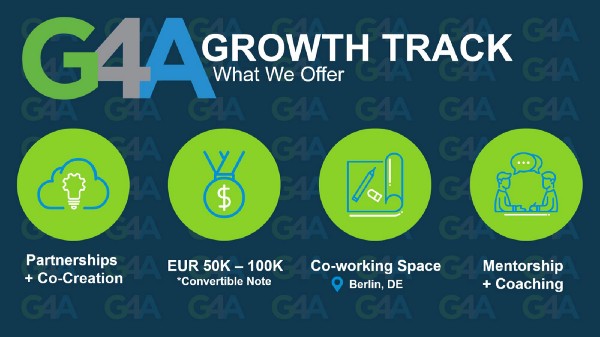F037 Digital health ecosystem, G4A and what entrepreneurs are doing wrong (Eugene Borukhovich, G4A)
G4A, formerly known as Grants4Apps is probably the most famous digital health accelerator running inside a Pharma conglomerate. At the moment, the program known as G4A is present in some form or another in 35 countries.
Six years ago, in 2013, Bayer supported an idea of Jesus del Valle, former Head of G4A, to bring some “fresh air” and bold ideas of startups to the headquarters of an established company in Berlin, Germany.
Find the podcast on Podbean, iTunes or Stitcher.
For a few years, the program was designed to support a handful of startups by offering them office space, various entrepreneurship skills training and network expansion inside Bayer HQ in Berlin. As the digital health market evolved, so has the program.
G4A is evolving each year in terms of support offered to startups. While programs diversified up until last year, the process to get involved is simplified this year by a single point of entry to apply. The application process has been refined to specify in depth the solutions Bayer is looking for, and fall in line with Bayers interests. An improved selection process is aimed at helping startups but also the selection team, which received close to 1800 applications last year.
Eugene Borukhovich took over as the global head of G4A digital health development at Bayer in 2016. He has a rich history in digital health and health tech: in the past, he served as an advisor at HealthXL, a global platform offering the latest insights of digital health and catalyzing innovation. During his time In Amsterdam, Eugene founded a non-profit organization called Future of Health Foundation and the Health 2.0 Amsterdam Chapter. He was an Entrepreneur in Residence at the Personal Health Solutions investment firm, before taking the position to drive G4A forward.
To hear more about G4A, its evolution and what to expect from the selection process, listen to the discussion with Eugene.
Digital health space is maturing
Reflecting on the digital health in the last years, Eugene believes the sector is maturing. Quite a few scandals have plagued digital health and biotech lately — the latest one about the startup uBiome being raided by the FDA due to their problematic billing practices. Or the prominent Theranos case, where the founder was able to get the company to a 9 billion USD valuation, all the while hiding that the technology of the company, blood diagnostics from a drop of blood, did not work. Eugene believes these stories are forcing the ecosystem to mature and the stakeholders — from investors to reporters and supporters, to be more cautious about new solution and the evidence supporting their claimed benefits: “As a good entrepreneur you want to be able to sell your solution, but you also got to know If and when you can deliver. I think the industry has learned that a bigger emphasis needs to be put to clinical validation, not just the growth of companies.”
This, in turn, is bringing a demand for a new level of rigor for startups, which have to provide increasing proof, practice more testing before scaling their solutions. “The demands for better regulation and more evidence supporting the claimed efficacy of digital health solutions will create some hurdles for the founders, but the hurdles are needed: they will filter out those only chasing the money flowing in the industry, and leave the founders chasing a mission with the skills to bring an idea to the next level,” says Eugene.
Given his past and present experiences with startups, there are three things Eugene likes to point out entrepreneurs still often lack:
Work on the value proposition pitch. While refining your idea over time is an essential part of every solution, presenting ideas in a condensed way is still a challenge for many startups. Even though it might seem impossible to present a solution in a short few sentences, it is essential to gain attention from investors, entrepreneurs you want the support from.
Do your homework and research. Time is becoming a currency and a resource everyone wished they’d have more of. Know who you’re talking to and what their interests are before you approach them. Don’t look for the quantity of people you reach, devote your time to find those you assess might be most helpful to you and focus on their background and motivations.
Have your data ready. Digital health is still related to health and serious science. Because of the hype, actual data is gaining in importance from the early stages of startups.
Listen more in the podcast.
Some questions addressed:
How do you observe various entrepreneurial practices around the world? What are scandals such as the trial of the founder of the blood testing company Theranos Elizabeth Holmes, the news that the microbiome company uBiome was raided by FBI due to their billing practices, affect digital health ecosystem?
Do you think the digital health space is getting more demanding for startups with the rising demands for more validation and peer reviewed articles?
What are your personal experiences with the Dutch and the German healthcare system?
Regarding G4A:
How many applications do you expect based on previous years?
How many companies are getting in?
What international support can you offer to companies given the expansion?
What are the common not mistakes but “clumsiness” of entrepreneurs you come across often?

